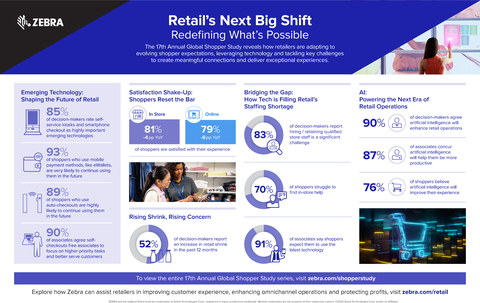84% of Retail Associates Concerned About Loss Prevention, According to Latest Zebra Study
Lack of associate assistance, self-checkout lanes, and shelf inventory among rising shopper concerns as satisfaction dips

Zebra Technologies' 17th Annual Global Shopper Study reveals how retailers are adapting to evolving shopper expectations, leveraging technology and tackling key challenges to create meaningful connections and deliver exceptional experiences. (Graphic: Zebra)
With most retailers (
This should come as a relief to shoppers, as
One in five shoppers who left a store without getting what they needed say it’s because a retail associate wasn’t available to help, an increase over the past two years.
Other Issues Contributing to Associate Frustration, Decline in Shopper Satisfaction
Although consumers are still generally satisfied with their shopping experience and global consumer spending is holding steady, fewer shoppers overall are satisfied with their shopping experiences this year. In 2023,
Shoppers expect retailers to offer easy click-and-collect and returns options, yet retailers and associates admit challenges with both. Most retailers also say it’s a struggle to confirm current inventory and pricing. Plus, with more shoppers returning to stores, lingering labor shortages and increasing loss incidents are having a greater impact on service levels. For example:
-
78% of shoppers say self-checkout options improve their shopping experience, yet68% of shoppers say self-checkout (SCO) lanes are lacking, with some reporting they have left a store without making a purchase because there were no SCO or contactless payment options. -
71% of shoppers are concerned about the lack of help associates can offer, while82% of associates say it’s even difficult for them to find help or ask for timely support when needed.
Nearly
“Many retailers are laying the groundwork to build a modern store experience,” said Matt Guiste, Global Retail Technology Strategist, Zebra Technologies. “They are investing in mobile and intelligent automation technologies to help inform operational decisions and enable associates to do the things that keep shoppers happy.”
Along with enhancing the customer experience, the study shows retailers’ top priorities include improving mobile workforce efficiency and productivity along with inventory management. More than one-third of them (
How Retailers Can Recover from the Year-Over-Year Decline in Shopper Satisfaction
Retailers can exceed shopper expectations, drive profitability and empower engaged associates if they:
-
Get to know their customers. Three-quarters (
75% ) of shoppers are more willing to try and buy items when retailers know their personal preferences and associates make recommendations. - Make it easier to find, pay for, and return items and find item-related information. Shoppers want associates to be available, and they are driven to retailers who can help them more easily find or return items.
-
Keep shelves stocked. While fewer shoppers are complaining about out-of-stocks, this remains the top reason why over half (
57% ) of shoppers leave a store without items they want, and more associates (86% ) are now struggling with real-time out-of-stock tracking. -
Protect shoppers without over-indexing on loss prevention. Most shoppers (
71% ) are concerned the stores at which they shop are experiencing high levels of theft and crime. Like associates, they worry threats can’t be spotted or stopped. However,77% of shoppers are also concerned retailers may raise prices to cover the cost of increasing theft and crime. -
Avoid passing operational costs onto customers. Shoppers are more price sensitive than ever, with over three-quarters (+
75% ) worried inflation will drive up the prices of both everyday essentials and big-ticket items and force them to reduce overall spending. -
Give associates more technology. Most associates (
85% ) feel strongly that their store needs more associates, and81% of retailers agree. Associates also believe stores that leverage retail technology and mobile devices attract and retain more associates, and shoppers have a better experience when associates use the latest technology to assist them.
KEY REGIONAL FINDINGS
-
80% of decision-makers plan to boost investments in supply chain, outpacing the global average.
-
66% of shoppers leave stores without all the items they need, the highest of any region.
-
More decision-makers (
57% ) noted an increase in retail shrink rates in the past 12 months than their counterparts around the world.
- Nearly six in 10 retail decision-makers plan to use RFID tags and sensors in the next five years.
ABOUT THE 17th ANNUAL GLOBAL SHOPPER STUDY
Zebra Technologies commissioned a global research study among adult shoppers (age 18+), decision-makers, and associates to analyze the trends and technologies transforming the retail sector. Administered online by Azure Knowledge Corporation, this year’s study includes over 4,200 respondents across topics of shopper experience, device and technology usage, delivery and fulfillment in store and online. Zebra’s 17th Annual Global Shopper Study reports on the attitudes, opinions, and expectations shaping the industry’s future. The series focuses on three key themes: Beyond Expectations, Driving Profitability, and The Power of Engaged Associates. To view the entire 17th Annual Global Shopper Study series, visit zebra.com/shopperstudy.
ABOUT ZEBRA TECHNOLOGIES
Zebra (NASDAQ: ZBRA) helps organizations monitor, anticipate, and accelerate workflows by empowering their frontline and ensuring that everyone and everything is visible, connected and fully optimized. Our award-winning portfolio spans software to innovations in robotics, machine vision, automation and digital decisioning, all backed by a +50-year legacy in scanning, track-and-trace and mobile computing solutions. With an ecosystem of 10,000 partners across more than 100 countries, Zebra’s customers include over
ZEBRA and the stylized Zebra head are trademarks of Zebra Technologies Corp., registered in many jurisdictions worldwide. All other trademarks are the property of their respective owners. ©2024 Zebra Technologies Corp. and/or its affiliates.
View source version on businesswire.com: https://www.businesswire.com/news/home/20241113425132/en/
Media Contact:
Michael Gilhooly
Zebra Technologies
+1-708-814-5281
michael.gilhooly@zebra.com
Industry Analyst Contact:
Kasia Fahmy
Zebra Technologies
+1-224-306-8654
k.fahmy@zebra.com
Source: Zebra Technologies Corporation







